Pool Fence: Protect Your Pool with a Safety Enclosure.
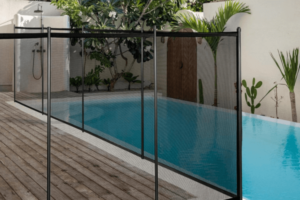
If you’re a pool owner, one important consideration is having a pool fence. A pool fence does more than just look nice – it protects your family, provides an essential safety barrier and gives your pool area some privacy.
If you’ve been thinking about installing a new pool fence or just want to learn about the different options, you’ve come to the right place! In this article, we’ll cover everything you need to know about pool fencing, including the different types of fences, key features to look for, installation tips, and reasons why people search for pool fences in the first place.
| Disclosure: We use affiliate links in our content. This won’t cost you anything but as Amazon affiliates, we earn from qualifying purchases to help offset the cost of paying our writing team. |
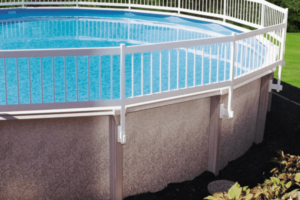
Safety is the number one reason for pool fences. Preventing unsupervised access, especially by young children, is a top priority. But aesthetics, privacy, replacing an old fence, new pool installation, and remodeling projects are also common motivations for considering new pool barriers.
Let’s start by looking at the most popular styles of pool fences and the pros and cons of each option. We’ll also cover how to choose the best fence for your home, as well as installation factors and ongoing attention.
Reasons People Search for Pool Fence
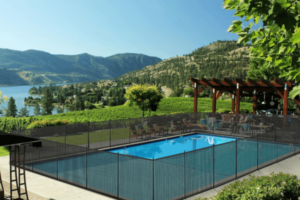
Installing a fence around your residential swimming pool is one of the most important safety investments you can make. There are many motivations that prompt pool owners to research pool fences and enclosure options. Here are some of the most common reasons to look into pool fencing:
Pool Safety
The number one reason people investigate pool fences is for safety, especially families with children. Properly enclosing a pool creates an important barrier that prevents unsupervised access. Pools attract kids, so fencing is crucial to prevent accidental drownings. Having a fence with a self-closing and self-latching gate provides an additional layer of protection. Many states and local municipalities require pool fencing for safety reasons.
Privacy
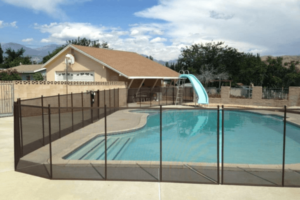
Another motivation for pool fencing is privacy. An enclosed pool area blocks views into your yard and swimming area. Fences create seclusion from surrounding homes and limit visibility by neighbors or passerby. For those wanting more privacy in their oasis, a tall pool fence is ideal.
Aesthetics
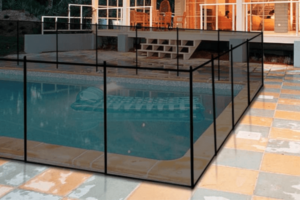
Some explore pool fences for aesthetic reasons. The fence is part of the overall backyard landscape design. Choosing a stylish fence or gate can complement the home’s exterior as well as the landscape. For many people, the right fencing pulls the look together and makes the pool area more inviting.
New Pool Installations
When installing a brand new pool, proper fencing is always required. Pool fences must be included during the planning and design process. The style of fence and gate are important choices. New pool installations almost always include the selection of pool fencing.
Replacing Old Fences

Over time, pool fences become weathered and need to be replaced. People search for new fence options when the current fence is falling apart or no longer doing its job. Damaged, broken or faulty fences necessitate a replacement fence.
DIY Installation
Some handy people take on pool fence installation as a DIY project. They research supplies needed and instructions for installing their preferred type of fence. While professional installation is recommended for safety, some opt to do it themselves to save on labor costs.
Renovation Projects

When renovating or remodeling a landscape, the pool fencing is often considered as part of the updates. Changing the fencing can help give the pool area a fresh new look. Pool remodels present an opportunity to alter both the functionality and aesthetics of the backyard with new fencing.
Types of Pool Fences
When it comes to pool fences, there are several material and style options to consider. The most popular types of fences for enclosing a pools include mesh, glass, metal, wood and vinyl. Let’s take a look at the unique characteristics of each fence type.
Mesh Pool Fencing

Mesh pool fencing features an open diamond pattern constructed from durable polyethylene resin. It provides safety and security while maintaining a high level of visibility. Mesh fencing is affordable and easy to maintain. It won’t rot, rust or need repainting. A major downside is that it lacks privacy.
Glass Pool Fencing
Glass pool fences, including tempered and laminated glass, offer a contemporary, elegant look. Glass provides unobstructed backyard views. Drawbacks are the high upfront cost and the risk of breaks and cracks over time. Fogged glass also needs regular cleaning.
Metal Pool Fencing

Metal choices like aluminum fence and wrought iron provide classic beauty and security around pools. They are long-lasting when properly maintained. Metal fences come in various decorative styles. Downsides are higher cost and the need for repainting to prevent rust over the years.
Wood Pool Fencing
Wood varieties like cedar and redwood have a timeless, natural look. Wood fences complement landscaping well and come in designs from simple to ornate. The downside is that wood requires the most maintenance with staining/sealing to prevent weathering and decay.
Vinyl Pool Fencing

Vinyl is a low maintenance option, offering durability and resistance to weathering. It’s available in picket, lattice and privacy styles that mimic wood. Vinyl won’t rot, peel or need repainting but lacks the natural beauty of real wood. It can become brittle and crack over time.
Choosing the Best Pool Fence
When deciding on a pool fence, there are several key factors to take into account to ensure you pick the right one for your backyard. Consider the following features and considerations when selecting a fence:
Safety Features
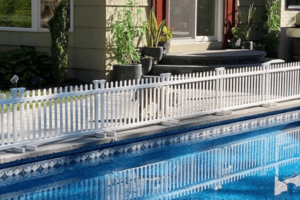
The main priority is safety, so be sure to choose a fence that is non-climbable, at least 4-5 feet tall, and has a self-closing/self-latching gate. Ensure it meets all local safety codes and pool barrier requirements.
Aesthetics
Choose a material and style that complements your home’s exterior design and landscaping. Consider visibility and privacy needs as well. A mesh fence provides more visibility while a solid wood fence increases privacy.
Maintenance

Compare the ongoing work needed of different fencing based on the material. Vinyl, aluminum and steel are easy to maintain. Wood requires the most upkeep, while glass needs frequent cleaning.
Costs
Look at both installation costs and long-term expenses. Metal, wood and glass fences tend to cost more upfront. Consider the long term costs as well for painting, staining, repairs, etc.
Ease of Installation
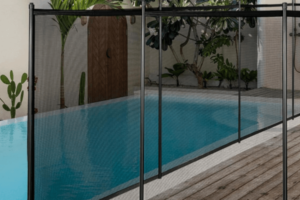
Some fences like mesh and vinyl are relatively easy for DIY. Materials like wood or metal may require professional installation. Assess your skill level if doing it yourself.
Local Regulations
Research your local regulations on fence height, materials, and gates. Some communities restrict certain fence types. Make sure to have the inspector approve your fence plan and pool gate.
Maintaining Your Pool Fence
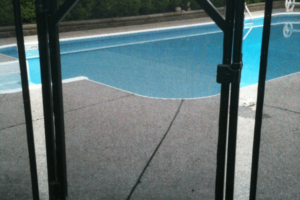
Installing a pool fence is only part of the process – proper upkeep keeps your fence looking great and performing safely for years to come. Here are some tips for caring for common pool fence materials:
Vinyl Fencing
Vinyl is less demanding but still requires occasional upkeep. Wash it down annually with mild soap and water. Reapply vinyl protector every few years. Watch for cracks or holes and repair as needed.
Wood Fencing

Untreated wood will weather, rot and decay rapidly. Apply water sealant or wood preservative regularly per manufacturer instructions. Inspect for damage. Sand down rough areas and refinish with stain or paint.
Metal Fencing
Metals like aluminum and wrought iron need repainting to prevent rust and corrosion. Wash regularly and apply touch-up paint when needed. Check for structural damage and make repairs promptly.
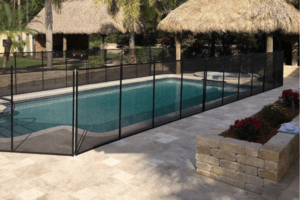
Glass Fencing
Use a squeegee after rainstorms and monthly power washing to prevent water spots and calcium buildup on glass. Inspect for cracks or breakage. Apply protective wax 2-3 times per year.
Mesh Fencing
Mesh is easy to care for. Hose it down periodically and check for holes or sagging sections. Replace damaged mesh panels as needed. Re-tighten any loose vinyl-coated wire.
For all fence types, inspect regularly for holes or damage that can create a safety hazard. Check that gate latches and closures work properly. Maintain the fence perimeter by clearing away debris and trimming vegetation.
Installing Your Pool Fence

When it’s time to install a new pool fence, you have two options – DIY or hire a professional.
DIY Installation
Installing a pool fence yourself is possible with the right skills and experience. Vinyl and mesh styles are easier for beginners. Follow all manufacturer instructions carefully. Have another person help position posts and panels. Use precise measurements and leveling tools to ensure proper setup. Hire a fencing contractor for complex installations or unique site conditions. Always check local permit and inspection requirements.
Professional Installation
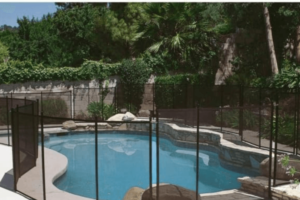
Hiring a qualified fencing contractor is recommended for most pool fences. Pros have the expertise to handle challenging installations and modify fences to fit your specific backyard terrain. They have the right equipment and tools to efficiently install wood, metal, glass and other intricate fencing. A professional can advise on meeting safety codes and permit requirements too. Do your research to find an experienced local contractor. Get multiple quotes to compare pricing.
For any pool fence installation, inspect the fence thoroughly once completed. No matter who installs your new barrier, be sure to follow all local safety regulations. Your pool fence is a crucial safety investment that requires proper installation and care.
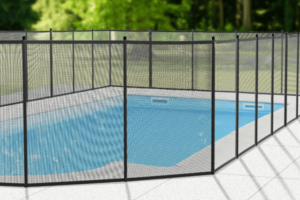
Conclusion
When it comes to pool fence, properly enclosing your backyard oasis is a must. As we’ve covered, there are many excellent reasons homeowners investigate pool fences – from preventing accidents to gaining privacy. Safety is always the number one concern, especially for families with young children.
Beyond safety, factors like aesthetics, cost, and ease of care also drive the selection of pool barriers. Homeowners want an attractive fence that complements their landscape design, while also fitting their budget. The good news is there are great fencing options available in various styles and materials to match diverse needs and preferences.
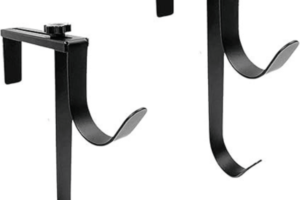
In your research, you’ll likely encounter popular choices like mesh, wood, vinyl, metal and glass fencing. Each has their own pros, cons and maintenance requirements to weigh. Focus on safety features plus your needs for privacy, appearance and cost. With good planning, you can install a pool fence that checks all the boxes.
And don’t forget – a properly maintained fence lasts longer and does its job better. Apply the right care for your fence type, make repairs promptly, and replace aging fences when required. Installing and caring for your pool fence is a smart investment that provides security, looks great, and will be enjoyed for many years.
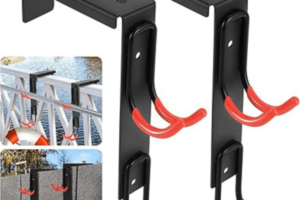
Frequently Asked Questions
Q: Why is pool fencing important?
A: Pool fences are critical for safety, especially preventing unsupervised access by children. They provide an essential barrier around the area. Fences also give pool owners privacy and help create an inviting oasis.
Q: What are the most popular types of pool fences?
A: The main options are mesh, wood, vinyl, metal, and glass. Each has pros and cons to consider in terms of aesthetics, durability, and cost to keep it up.
Q: What features should I look for when choosing a fence?
A: Key factors are safety, appearance, upkeep, cost, and ease of installation. Make sure the fence meets all local safety regulations. Aesthetics and privacy are also driving forces behind fence selections.
Q: Is DIY installation possible?
A: Some vinyl and mesh fences can be installed DIY, but professionals are recommended for most pool fences, especially wood, metal and glass. Experts can handle challenging settings.
Q: How can I make my fence last?
A: Applying preventative care specific to your fence type will prolong its life and function. Regularly inspect for damage, promptly make repairs, and replace worn fencing as needed.
Q: Does my pool need a fence?
A: Most areas require pool fencing for safety and liability reasons. Always check your local regulations. Properly enclosing your pool is a wise investment in protection and peace of mind.
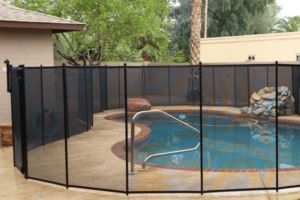
Comments